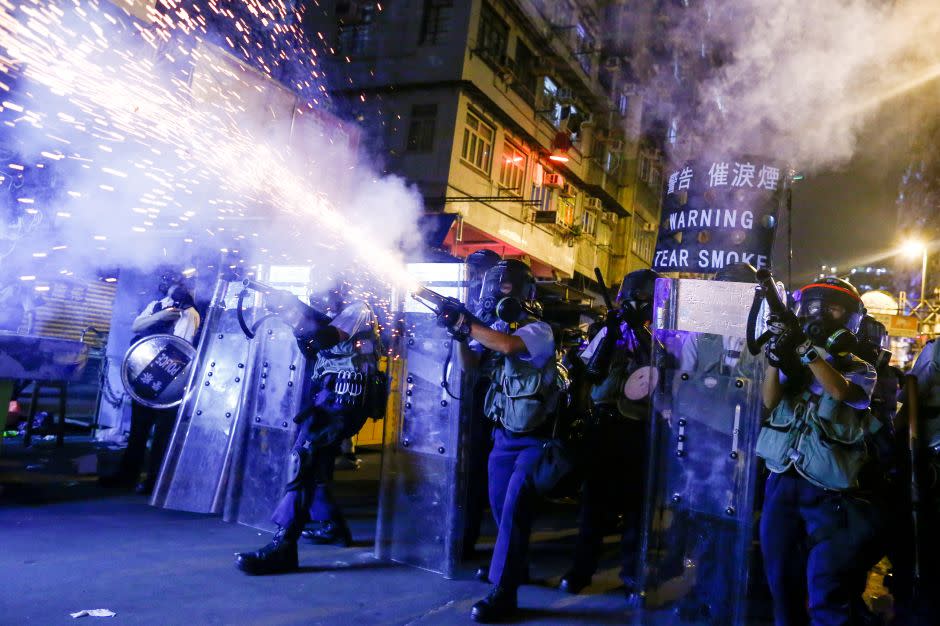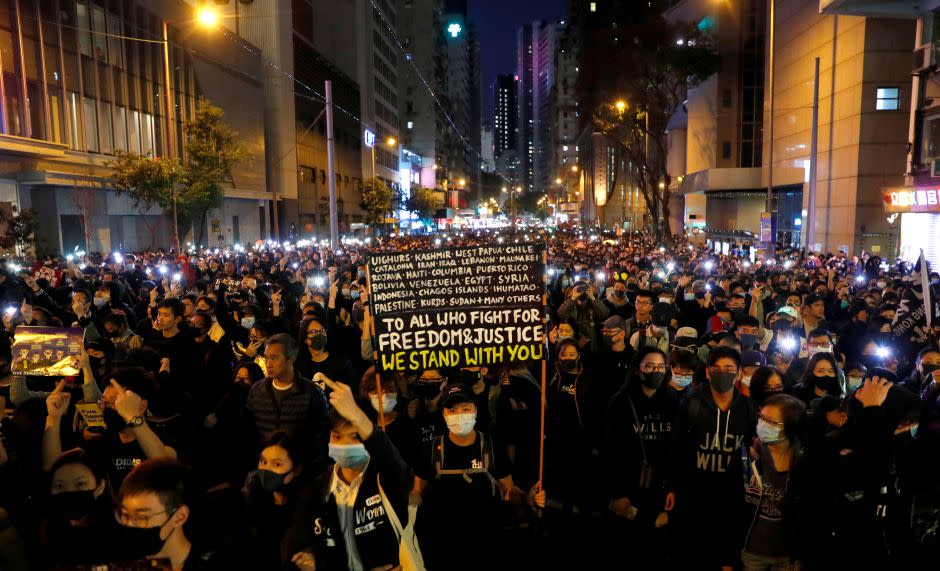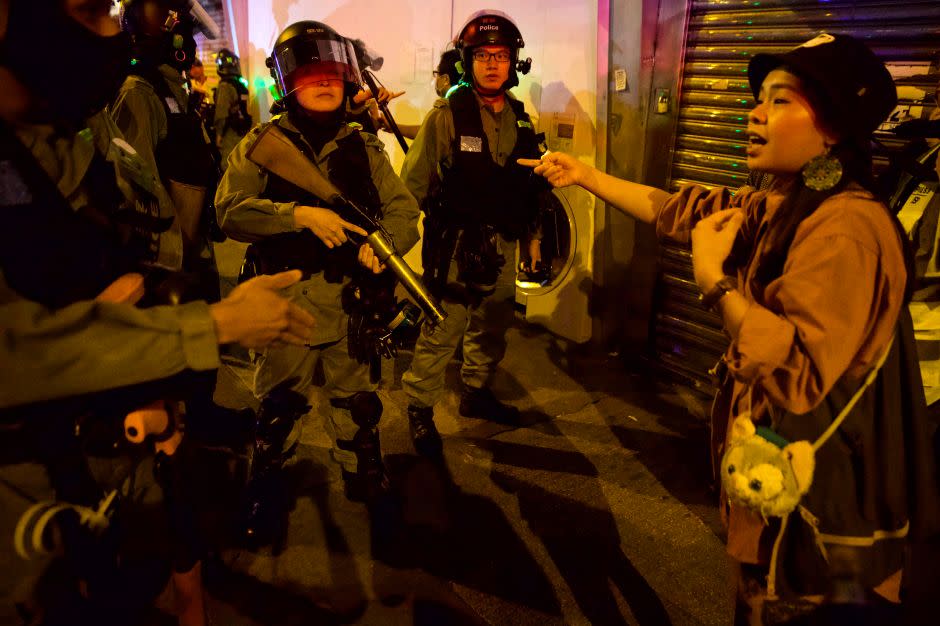Who will police the Hong Kong police?

It appears no one wants the unenviable task of policing the Hong Kong police.
An international panel of experts recruited to advise the city’s internal police watchdog in its study of the force’s handling of protests has quit, casting serious doubt on whether the embattled law enforcement body will ever be properly held to account over widespread allegations of abuse and excessive use of force.
In a statement issued today (Dec. 11), the five foreign experts who had been hired by the government to ensure “objectivity and impartiality” (pdf) in the probe said its concerns over the Independent Police Complaints Council’s (IPCC) insufficient powers and investigative capabilities remained unresolved. The experts had last month urged an independent investigation.
The development deals a major setback to the local government and police as they scramble to find a solution to the city’s political crisis. A recent poll shows over half of Hong Kong’s population say they now have absolutely no trust (link in Chinese) in the law enforcement agency, and an overwhelming majority want an independent commission of inquiry with robust powers to examine police conduct—perhaps the most pressing of the protest movement’s remaining demands.
#hkpolice patroled with AR-15 this morning. Just look at how kids and parents got shocked by the militarized police. #PoliceBrutalityHK #PoliceState pic.twitter.com/LgWu7T6rxd
— Demosistō 香港眾志
(@demosisto) December 9, 2019
Since the protests began in June, the police has gone from a broadly respected institution to a widely hated body, as the list of public grievances against them has grown steadily. Multiple protesters have been shot with live rounds, some at point-blank range, and there are allegations of abuse of detainees. Civilian volunteers have compiled reams of video and photographic evidence of police use of force—one group has published a 381-page report with suggestions for police reform, while others have launched open-source citizen investigations into protest incidents.
Hong Kong’s chief executive Carrie Lam, however, maintains that the IPCC, whose inquiry is set to be delivered early next year (pdf), is sufficient. But six months into the protests, demands for an independent investigation are no longer just the domain of protesters.
A number of pro-government voices have publicly backed a probe into police conduct and the broader political crisis, including some of chief executive Carrie Lam’s advisers, businesspeople, diplomats, and religious figures. Given the now widespread backing for this demand, why hasn’t it happened already?
The untouchables
Lam’s continuing refusal to set up an independent inquiry has raised questions as to whether the government has ultimate authority over the police force in the wake of the territory’s return to China. In July, the city’s second-highest official apologized for the police’s delayed response to a gang attack on civilians at a train station, only to reverse course days later to say that he “fully supports” the force after criticism from police groups. Lam’s office declined a request for comment, and referred Quartz to a previous statement.
The newly appointed police commissioner has said that the existing watchdog should handle all complaints, because an independent inquiry would “target and attack” the police force and therefore be “unjust.” Indeed, many in Hong Kong now see the entire government as deferential to the police, which itself is perceived as a paramilitary force doing the bidding of Beijing. Last week, China’s public security minister said he hoped to “strengthen collaboration” with Hong Kong police and “jointly safeguard national security and the social stability of Hong Kong.”

Police fired tear gas at protesters on August 14, 2019.
The bravado with which the police force has brushed off criticism reflects confidence that they will not be investigated. In some cases, they have defended their actions with explanations that border on the provocative. At a police press conference last month in response to a reporter’s question about why a police van charged at protesters at high speed, a spokesman said “driving fast doesn’t mean it’s unsafe.”
Adding to the perception of unaccountability is the feeling that police turn a blind eye to violence from pro-Beijing actors, making no immediate arrests after a mob of more than 100 armed men beat passengers at a train station in July, and arriving late to the scene. Police later tried to justify their slow response by pointing to the 24,000 emergency calls received that evening, accusing some users of trying to jam the hotline. Police declined a request for comment, and referred Quartz to previous statements.
Here's a touching moment between Hong Kong police, and white-shirted apparent Triad thugs still carrying the metal bars they used as weapons to thrash HK protesters in the horrific Yuen Long attack (still pic by NYT's Lam Yik Fei) https://t.co/7zxRtKXMUx pic.twitter.com/Y7JyxFugSs
— Ian Young (@ianjamesyoung70) July 22, 2019
Following a landslide defeat for pro-Beijing candidates in local elections last month, which spurred hopes the government would finally agree to an independent inquiry, Lam didn’t budge, but said she would form an independent review modeled on a panel set up by the UK government after the Tottenham riots in London in 2011. She didn’t say what sort of powers it would have. The recommendations (pdf) of the Tottenham report were largely ignored by the government and antipathy toward the police lingered years after the riots.
Lessons from history
Acting upon the most heavily supported demand—and in many ways the easiest to fulfil—could at least temporarily ameliorate tensions, which Lam has repeatedly said is her priority.
According to Brian Dooley, a senior advisor at Washington, DC-based Human Rights First, an international human rights organization, “Part of the problem is that people think there’s never going to be accountability, never going to be justice, never going to be the full truth told.” But “just showing that you are entering into a process to produce at least the truth” helps, he said.
While there isn’t a magic formula for the perfect inquiry, successful ones share several factors, said Dooley: they command public trust, which can come from having a diverse body of commissioners and a transparent process; they are established soon after the incident in question and are completed relatively quickly; and they offer robust recommendations for reforms.
In Hong Kong’s case that might involve, for example, stricter protocols on the use of tear gas and firearms—a former Australian police officer who examined video of steps preceding a police shooting of a protester said the officer demonstrated “unacceptable use of a firearm” in a crowd.
Dooley noted the Scarman inquiry, which placed blame squarely on the police for the outbreak of the 1981 Brixton riots in the UK after the murder of a black teenager, as an example of an investigation that addressed root causes by changing policing tactics. The Saville inquiry, which was established to investigate the 1972 Bloody Sunday crackdown during the Troubles in Northern Ireland, was comprised of international judges and inspired trust, though it was established two decades after the incident and took a dozen years to complete—just this September, a former soldier accused of two murders on Bloody Sunday was charged in court for the first time. Both of these cases, Dooley said, can serve as reference points in determining the makeup and scope of an inquiry in Hong Kong.

An estimated 800,000 protesters marched on Dec. 8, 2019.
Adding fuel to Hong Kong protesters’ anger is that, of the many other countries that have seen mass protests this year, some—notably democracies—have already investigated the conduct of authorities. In Chile, where weeks of riots left more than 20 dead, public prosecutors are investigating more than 1,000 cases of alleged abuses by the police and military. Chilean police last month also suspended the use of rubber bullets, after more than 200 cases of eye injuries were documented. Meanwhile, a French police officer became the first member of the security forces to face trial last month on charges he hurled a pavement stone at protesters during Yellow Vest protests.
Others have pointed to the Los Angeles Police Department as another case study. After the 1992 riots sparked by the acquittal of officers involved in the savage beating of Rodney King, a black man, the city’s mayor commissioned an investigation that found a pervasive pattern of excessive use of force by officers and the department’s failure to rein it in. Years later, in 2001, the US justice department imposed a consent decree on the police department, placing it under federal oversight and requiring a series of major institutional reforms.
“Unless an inquiry can be shown to be both transparent and fair, and meticulous and robust in its working methods, it may simply do more harm than good,” said Michael Hamilton, a senior lecturer in public protest law at the University of East Anglia in the UK. An “overly legalistic” approach could become protracted and costly, while “an inquiry that lacks sufficient powers of investigation can be potentially retraumatizing,” he added.
One country, two systems, no inquiry
Nonetheless, an independent commission of inquiry is still the best shot of resolving the “Catch-22” of seemingly endless violence by protesters and police, wrote Martin Purbrick, a former colonial-era police officer in the city who said that officers become more emboldened when they don’t face punishment for breaching protocols. Seemingly buoyed by Beijing’s assurances that the central government fully supports the force, some officers have even created accounts on Chinese social network Weibo where they boast of their actions in Hong Kong, garnering large fan bases.
Purbrick, who now works in a security role in Hong Kong, sees the issues currently vexing the police as largely a management problem. The force’s rigid structure and culture, he told Quartz, “does not lend itself to creative ideas from junior management in times when existing rules are not working.” Management has also proved to be unable or unwilling to control officers who act out of line. And as an organization, he added, the force appears to be unconstrained by clear parameters set by the government.

A resident argued with riot police outside the Prince Edward metro station on Nov. 30, 2019.
For now, Hong Kong is stuck in a bruising deadlock. One reason for the stalemate, in contrast to elected governments elsewhere, is that while civil liberties such as freedom of speech and a free press are largely guaranteed under the laws that grant Hong Kong autonomy from mainland China, it isn’t a full democracy and the government is not fully accountable to the people. This allows it to ignore widespread popular demands.
“Hong Kong is caught in the middle of ‘one country, two systems,'” said Lawrence Ho, an academic at the Education University of Hong Kong who researches policing. The city has some degree of democracy, but it’s neither a liberal democratic regime, where an elected leader would step down, nor an autocratic one, where leaders would immediately replace problematic officials, he said. “If we were in one of the two extremes, this deadlock would not be kept.”
Tripti Lahiri contributed reporting.
Sign up for the Quartz Daily Brief, our free daily newsletter with the world’s most important and interesting news.
More stories from Quartz:

